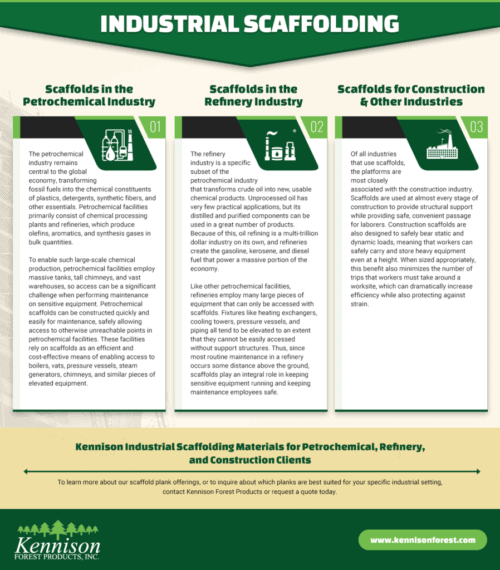Scaffolds are temporary platforms that allow easy access to an industrial work site or construction site. Depending on the application, scaffolds can also be used to provide architectural support to a building even as work continues on the structure. Typically constructed from cost-effective, sturdy timber and sometimes supplemented by aluminum or steel supports, scaffolds are affordable and easy-to-erect, offering flexible and low-cost access to structures.
Although scaffolds are often associated with the construction industry, they find extensive use across industrial facilities such as petrochemical sites and refineries. In these settings, scaffolds often allow significant cost-savings when constructing access platforms, using cost-effective materials and flexible supports to yield stable and affordable structures.
Different types of scaffolds support a wide range of applications. For example, although scaffolds are almost always temporary structures, some scaffolds are fixed more permanently in place than others. In some cases, such as repairs to a fixed-height tank, the worker does not need to adjust the height of the platform once it is in place. Traditional timber scaffolds or trestle scaffolds, both of which combine plank walkways with stationary supports, are appropriate in this situation.
In other situations, such as allowing a window washer access to higher floors of a building, greater flexibility is necessary. In these cases, clients might opt for suspended scaffolds, which combine scaffolding planks with cables and ratchets so that the surfaces can easily be raised and lowered.
Regardless of the specific design or industrial application, virtually all scaffolds use planks to form the platforms. Planks offer the ideal combination of strength and dimensional stability while still being affordable and readily available. Kennison Forest is the leading name in scaffold planks, offering OSHA and ANSI-compliant boards for use in construction, petrochemical, refinery, and industrial industries.
Scaffolds in the Petrochemical Industry
The petrochemical industry remains central to the global economy, transforming fossil fuels into the chemical constituents of plastics, detergents, synthetic fibers, and other essentials. Petrochemical facilities primarily consist of chemical processing plants and refineries, which produce olefins, aromatics, and synthesis gases in bulk quantities.
To enable such large-scale chemical production, petrochemical facilities employ massive tanks, tall chimneys, and vast warehouses, so access can be a significant challenge when performing maintenance on sensitive equipment. Petrochemical scaffolds can be constructed quickly and easily for maintenance, safely allowing access to otherwise unreachable points in petrochemical facilities. These facilities rely on scaffolds as an efficient and cost-effective means of enabling access to boilers, vats, pressure vessels, steam generators, chimneys, and similar pieces of elevated equipment.
Scaffolds in the Refinery Industry
The refinery industry is a specific subset of the petrochemical industry that transforms crude oil into new, usable chemical products. Unprocessed oil has very few practical applications, but its distilled and purified components can be used in a great number of products. Because of this, oil refining is a multi-trillion dollar industry on its own, and refineries create the gasoline, kerosene, and diesel fuel that power a massive portion of the economy.
Like other petrochemical facilities, refineries employ many large pieces of equipment that can only be accessed with scaffolds. Fixtures like heating exchangers, cooling towers, pressure vessels, and piping all tend to be elevated to an extent that they cannot be easily accessed without support structures. Thus, since most routine maintenance in a refinery occurs some distance above the ground, scaffolds play an integral role in keeping sensitive equipment running and keeping maintenance employees safe.
Scaffolds for Construction & Other Industries
Of all industries that use scaffolds, the platforms are most closely associated with the construction industry. Scaffolds are used at almost every stage of construction to provide structural support while providing safe, convenient passage for laborers. Construction scaffolds are also designed to safely bear static and dynamic loads, meaning that workers can safely carry and store heavy equipment even at a height. When sized appropriately, this benefit also minimizes the number of trips that workers must take around a worksite, which can dramatically increase efficiency while also protecting against strain.
Other Industries
Although petrochemical, industrial, and construction facilities rely heavily on scaffolds, other industries also use these structures for convenient and affordable access to structures. These include:
- Renovation
- Building Inspections
- Civil Engineering
- Window Cleaning
- Film, Television, and Theater
- Marine Construction
In general, any industry that involves constructing or maintaining large structures can benefit from secure scaffolds. In these settings, as in the construction and petrochemical industries, scaffolds help workers clean, repair, inspect, and build structures in the most cost-effective manner possible, all without sacrificing safety.
Kennison Scaffolding by Industry Materials for Petrochemical, Refinery, and Construction Clients
Petrochemical facilities, refineries, and construction sites are rife with industrial hazards, especially when equipment is awaiting repair. These sites often process volatile or toxic chemicals and employ potentially dangerous machines that reach extreme temperatures and emit scalding steam. When employing construction or maintenance workers in these settings, it’s critical to provide durable equipment that can withstand the demands of these environments. The right scaffold planks allow industrial clients to take advantage of the cost-savings and efficiency benefits of scaffolds without putting employees at risk.
Kennison Forest Products, Inc., supplies high-quality wooden walk boards for construction, petrochemical, and refinery scaffolds. Our primary product offerings include SURE-LAM LVL scaffold planks made from Douglas fir and 2200F MSR 1.8E solid sawn scaffold planks made from Southern pine, both of which are OSHA/ANSI-compliant.
Kennison scaffold planks have a third party independent inspection, verifying that they adhere to the most stringent quality standards. In the petrochemical and construction industries, this certification grants peace of mind that workers won’t be put in danger from fake or substandard planks, which are prone to warping or failing under a dynamic load. Kennison boards, by contrast, are subject to the highest quality assurance protocols and are guaranteed to keep employees safe.
To learn more about our scaffold plank offerings, or to inquire about which planks are best suited for your specific industrial setting, contact Kennison Forest Products or request a quote today.

